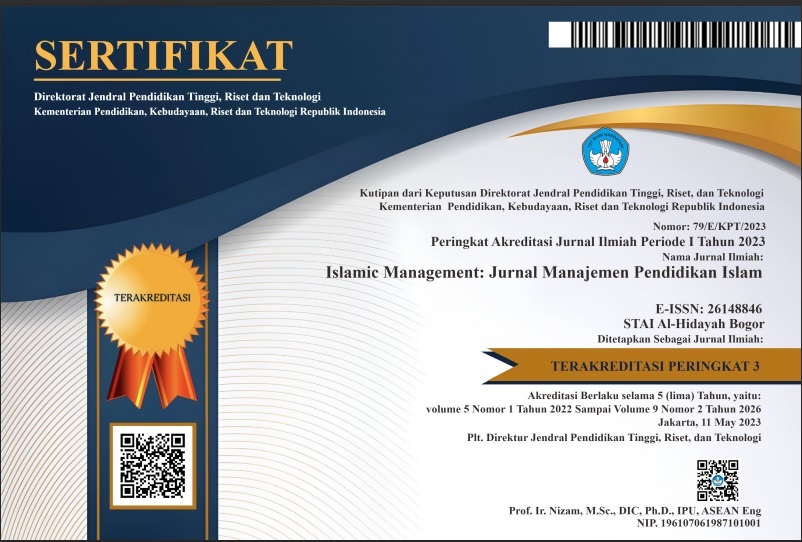CENTRAL ANALYSIS OF EDUCATION POLICY IN ISLAMIC BOARDING SCHOOL: CHALLENGES AND DEVELOPMENT STRATEGIES
DOI:
https://doi.org/10.30868/im.v8i01.8115Keywords:
Policy Analysis, Education in Islamic Boarding Schools, Challenges and StrategiesAbstract
This study aims to examine the education policy in Islamic boarding schools in facing the challenges of globalization by highlighting the role of Law No. 18 of 2019. A qualitative approach is used in this study, with literature studies as a method of collecting and analyzing data related to Islamic boarding school education policies. The results of the study indicate that Islamic boarding school education policies are regulated in Law No. 18 of 2019, which consists of nine chapters and 55 articles. The policy covers five main aspects: institutional forms, Islamic boarding school education objectives, funding sources, quality assurance, and education levels. In addition, globalization has a significant impact on Islamic boarding schools, especially in giving rise to apathy and a culture of laziness among students. Therefore, efforts are needed to develop the potential of students through the use of science and technology. The process of formulating Islamic boarding school education policies can be carried out through five stages: agenda setting, policy formulation, implementation, evaluation, and policy improvement. This study is expected to contribute as a reference in understanding Islamic boarding school education policies in depth and help formulate strategic steps in developing Islamic boarding school education policies in the era of globalization. The results of the study show that educational policies in Islamic boarding schools tend to focus on the tradition of teaching yellow books but are starting to adapt by including a formal curriculum.
References
Arief, Mohammad, and Ridhatullah Assya’bani. 2023. “Eksistensi Manajemen Pesantren Di Era Digital.” Al Qalam: Jurnal Ilmiah Keagamaan Dan Kemasyarakatan 16 (6). https://doi.org/10.35931/aq.v16i6.1541.
Diana Handayani. 2022. “Pesantren, Dinamika, Dan Tantangan Global: Analisis UU Pesantren No.18 Tahun 2019.” EL-HIKMAH: Jurnal Kajian Dan Penelitian Pendidikan Islam 16 (1). https://doi.org/10.20414/elhikmah.v16i1.6193.
Fauzan, Fauzan. 2017. “Urgensi Kurikulum Integrasi Di Pondok Pesantren Dalam Membentuk Manusia Berkualitas.” FIKROTUNA 6 (2). https://doi.org/10.32806/jf.v6i2.3097.
Huda, Sholeh, and Adiyono Adiyono. 2023. “Inovasi Pemgembangan Kurikulum Pendidikan Pesantren Di Era Digital.” ENTINAS: Jurnal Pendidikan Dan Teknologi Pembelajaran 1 (2).
Krisdiyanto, Gatot, Muflikha Muflikha, Elly Elvina Sahara, and Choirul Mahfud. 2019. “Sistem Pendidikan Pesantren Dan Tantangan Modernitas.” Tarbawi : Jurnal Ilmu Pendidikan 15 (1). https://doi.org/10.32939/tarbawi.v15i1.337.
Majdi, Muhamad. 2023. “Inovasi Pembelajaran Abad 21: Peluang Dan Tantangan Implementasi Kurikulum Merdeka Belajar Di Kampus Merdeka Belajar Pada STIT Buntet Pesantren Cirebon.” JIECO: Journal of Islamic Education Counseling 3 (1). https://doi.org/10.54213/jieco.v3i1.254.
Nasir, Abdul, Nurjana, Khaf Shah, Rusdy Abdullah Sirodj, and M Win Afgani. 2023. “Pendekatan Fenomenologi Dalam Penelitian Kualitatif 1✉.” INNOVATIVE: Journal Of Social Science Research 3 (5).
Nisa’, Vivin Nurwachidatin, and Zaenab Tri Lestari. 2023. “Kurikulum Pendidikan Pondok Pesantren Mambaus Sholihin Pada Kebijakan Pemerintah Di Era Society 5.0.” Journal on Education 5 (2). https://doi.org/10.31004/joe.v5i2.808.
Riyani, Ida. 2023. “Masadepan Pesantren Pasca Diundangkannya UU No. 18 Tahun 2019 Dan PERPRES No. 82 Tahun 2021.” TARBAWI : Jurnal Pendidikan Agama Islam 8 (01). https://doi.org/10.26618/jtw.v8i01.9276.
Rofi’i, Agus, and Royan Fakhrurozi. 2022. “Penyuluhan Tentang Aktualisasi Budaya Literasi Bagi Santri Di Lembaga Pondok Pesantren.” Papanda Journal of Community Service 1 (1). https://doi.org/10.56916/pjcs.v1i1.50.
Rohmadi, Syamsul Huda. 2017. “Pendidikan Islam Inklusif Pesantren ( Kajian Historis - Sosiologis Di Indonesia ).” FIKROTUNA 5 (1). https://doi.org/10.32806/jf.v5i1.2949.
Samudera, Sahara Adjie. 2023. “Undang-Undang Pesantren Sebagai Landasan Pembaruan Pondok Pesantren Di Indonesia (Studi Kebijakan UU No. 18 Tahun 2019).” Fahima 2 (2). https://doi.org/10.54622/fahima.v2i2.92.
Stoodley, Cathy, Lois McKellar, Mary Steen, and Julie Fleet. 2020. “Simulation in Midwifery Education: A Descriptive Explorative Study Exploring Students’ Knowledge, Confidence and Skills in the Care of the Preterm Neonate.” Nurse Education in Practice 42. https://doi.org/10.1016/j.nepr.2019.102635.
Susanto, Dedi, Risnita, and M. Syahran Jailani. 2023. “Teknik Pemeriksaan Keabsahan Data Dalam Penelitian Ilmiah.” Jurnal QOSIM : Jurnal Pendidikan, Sosial & Humaniora 1 (1). https://doi.org/10.61104/jq.v1i1.60.
Ulfah, Anisa. 2022. “MODEL LITERASI DIGITAL DALAM UPAYA MENGURANGI KESENJANGAN DIGITAL UNTUK SANTRI MENUJU INDONESIA EMAS 2045.” HUMANIS: Jurnal Ilmu-Ilmu Sosial Dan Humaniora 14 (1). https://doi.org/10.52166/humanis.v14i1.2772.
UU RI No 18. 2019. “UU No. 18 Tahun 2019 Tentang Pesantren.” Dokumen Negara (Undang-Undang Republik Indonesia Tentang Pesantren), no. 006344.
Downloads
Published
How to Cite
Issue
Section
Citation Check
License
Copyright (c) 2025 Wildan Alwi, Dudi Akasyah, Furqon Abdurrahman, Marhamah Marhamah, Popi Puadah

This work is licensed under a Creative Commons Attribution-ShareAlike 4.0 International License.
Authors who publish with this journal agree to the following terms:
- Authors retain copyright and grant the journal right of first publication with the work simultaneously licensed under a Creative Commons Attribution License that allows others to share the work with an acknowledgment of the work's authorship and initial publication in this journal.
- Authors are able to enter into separate, additional contractual arrangements for the non-exclusive distribution of the journal's published version of the work (e.g., post it to an institutional repository or publish it in a book), with an acknowledgment of its initial publication in this journal.
- Authors are permitted and encouraged to post their work online (e.g., in institutional repositories or on their website) prior to and during the submission process, as it can lead to productive exchanges, as well as earlier and greater citation of published work (See The Effect of Open Access).






